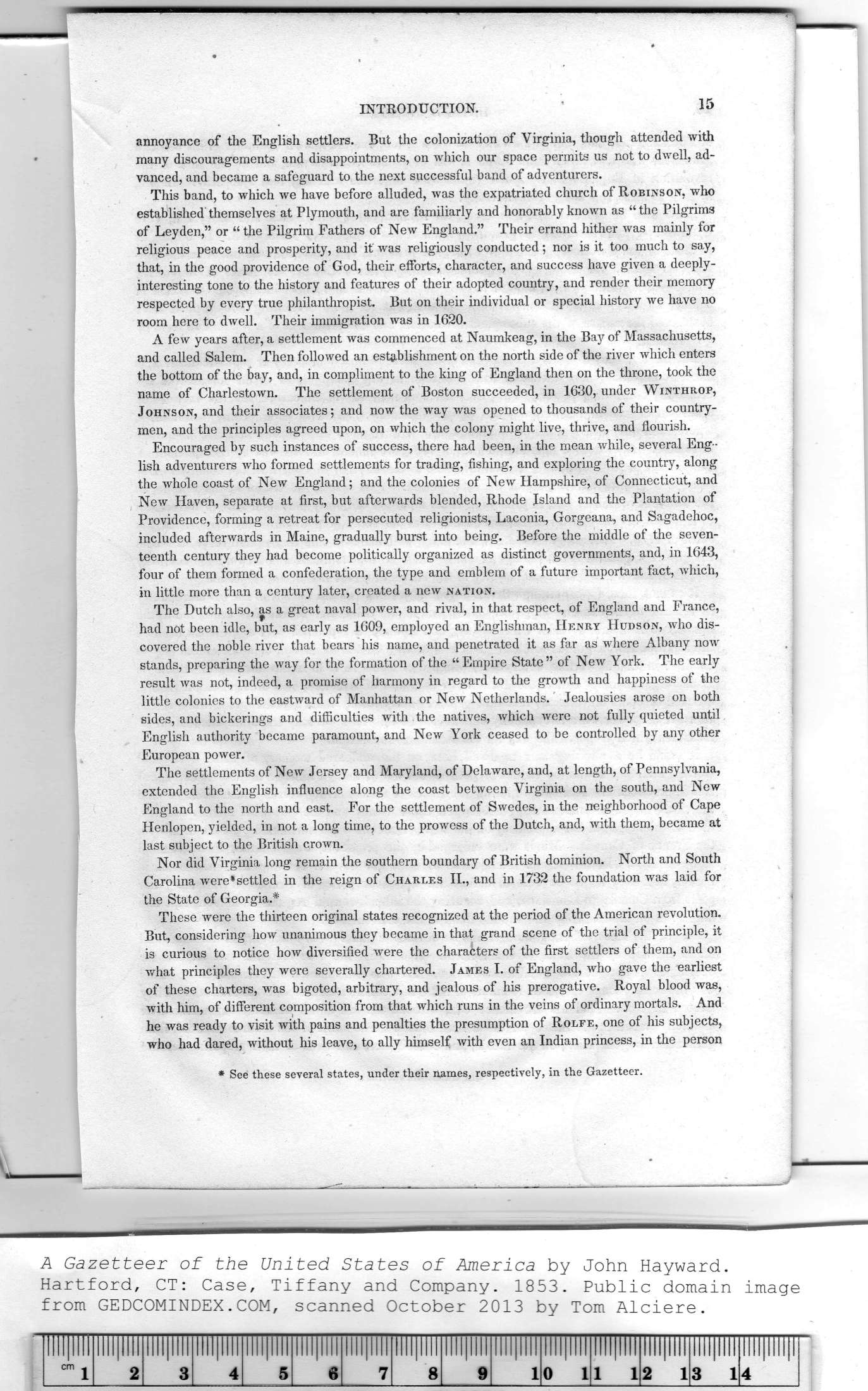|
|
Note: Ctrl and + increases the font size of the text below, Ctrl and - decreases it, and Ctrl and 0 resets it to default size.
INTRODUCTION. 15
annoyance of the English settlers. But the colonization of Virginia, though attended with
many discouragements and disappointments, on which our space permits us not to dwell, ad-
vanced, and became a safeguard to the next successful band of adventurers.
This band, to which we have before alluded, was the expatriated church of Robinson, who
established themselves at Plymouth, and are familiarly and honorably known as “ the Pilgrims
of Leyden," or “ the Pilgrim Fathers of New England." Their errand hither was mainly for
religious peace and prosperity, and it was religiously conducted; nor is it too much to say,
that, in the good providence of God, their efforts, character, and success have given a deeply-
interesting tone to the history and features of their adopted country, and render their memory
respected by every true philanthropist. But on their individual or special history we have no
room here to dwell. Their immigration was in 1620.
A few years after, a settlement was commenced at Naumkeag, in the Bay of Massachusetts,
and called Salem. Then followed an establishment on the north side of the river which enters
the bottom of the bay, and, in compliment to the king of England then on the throne, took the
name of Charlestown. The settlement of Boston succeeded, in 1630, under Winthrop,
Johnson, and their associates; and now the way was opened to thousands of their country-
men, and the principles agreed upon, on which the colony might live, thrive, and flourish.
Encouraged by such instances of success, there had been, in the mean while, several Eng-
lish adventurers who formed settlements for trading, fishing, and exploring the country, along
the whole coast of New England; and the colonies of New Hampshire, of Connecticut, and
New Haven, separate at first, but afterwards blended, Rhode Island and the Plantation of
Providence, forming a retreat for persecuted religionists, Laconia, Gorgeana, and Sagadehoc,
included afterwards in Maine, gradually burst into being. Before the middle of the seven-
teenth century they had become politically organized as distinct governments, and, in 1643,
four of them formed a confederation, the type and emblem of a future important fact, which,
in little more than a century later, created a new nation.
The Dutch also, as a great naval power, and rival, in that respect, of England and France,
had not been idle, but, as early as 1609, employed an Englishman, Henry Hudson, who dis-
covered the noble river that bears his name, and penetrated it as far as where Albany now
stands, preparing the way for the formation of the “Empire State" of New York. The early
result was not, indeed, a promise of harmony in regard to the growth and happiness of the
little colonies to the eastward of Manhattan or New Netherlands. Jealousies arose on both
sides, and bickerings and difficulties with the natives, which were not fully quieted until
English authority became paramount, and New York ceased to be controlled by any other
European power.
The settlements of New Jersey and Maryland, of Delaware, and, at length, of Pennsylvania,
extended the English influence along the coast between Virginia on the south, and New
England to the north and east. For the settlement of Swedes, in the neighborhood of Cape
Henlopen, yielded, in not a long time, to the prowess of the Dutch, and, with them, became at
last subject to the British crown.
Nor did Virginia long remain the southern boundary of British dominion. North and South
Carolina were‘settled in the reign of Charles II., and in 1732 the foundation was laid for
the State of Georgia.*
These were the thirteen original states recognized at the period of the American revolution.
But, considering how unanimous they became in that grand scene of the trial of principle, it
is curious to notice how diversified were the characters of the first settlers of them, and on
what principles they were severally chartered. James I. of England, who gave the earliest
of these charters, was bigoted, arbitrary, and jealous of his prerogative. Royal blood was,
with him, of different composition from that which runs in the veins of ordinary mortals. And
he was ready to visit with pains and penalties the presumption of Rolfe, one of his subjects,
who had dared, without his leave, to ally himself with even an Indian princess, in the person
* See these several states, under their names, respectively, in the Gazetteer.
|
lllllllll |
mi|Tiniiiii mi |
lllllllll |
lllllllll |
lllllllll |
lllllllll |
lllllllll |
llll|llll |
|
lffljffl|Tlll|llll |
llll|llll|llll|llll|l |
|
cl t1 ^ |
2' 3 |
4 |
5 |
6 |
7 |
8 |
9 |
10 1 |
i 1)2 1 |
3 14 |
|
